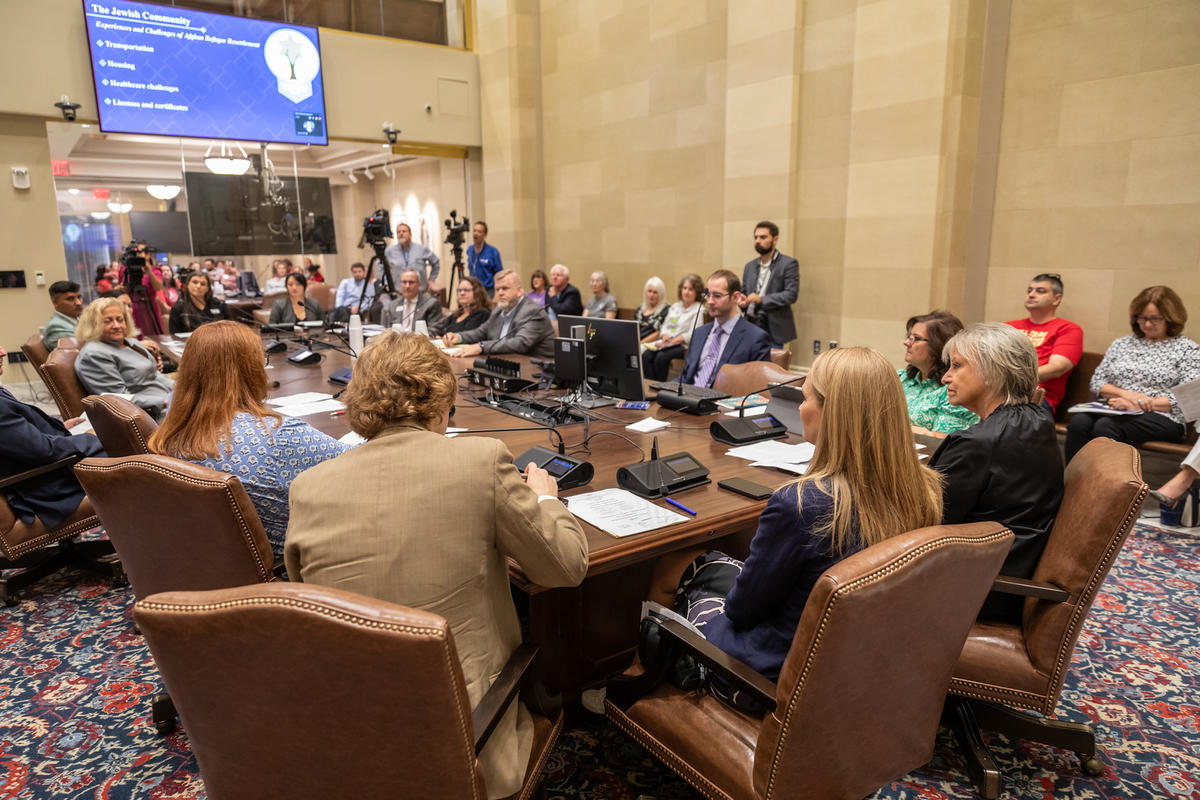In order to provide equal access and equal opportunity to people with diverse abilities, this site has been designed with accessibility in mind. Click here to view
Senate committee studies Oklahoma’s Afghan refugee program

OKLAHOMA CITY – The Senate Veterans and Military Affairs Committee examined Oklahoma’s Afghan Placement and Assistance (APA) Program Tuesday, which was the second anniversary of the fall of the Afghanistan government. The interim study was requested by Sen. Carri Hicks, D-Oklahoma City, to review the program’s strengths, ongoing challenges, and what steps can be taken to improve future refugee efforts.
Following the fall of the capital city of Kabul in 2021, more than 120,000 allies were airlifted out of Afghanistan, making it the largest non-combatant evacuation operation in U.S. military history. Of those refugees, some 72,000 were resettled in the United States with Oklahoma set to receive the highest number per capita and the third highest overall next to California and Texas.
“When tragedy struck the people of Afghanistan, Oklahoma’s interfaith community stepped up and welcomed hundreds of refugees fleeing for their lives,” Hicks said. “Today, more than 1,800 Afghanis now call Oklahoma home, including 40 babies who have been born here in the Sooner State. I want to ensure that should another refugee crisis arise that Oklahoma is better prepared to provide proper care, housing, and other basic needs for families.”
Oklahoma’s resettlement effort was led by Catholic Charities, which is the state’s only federally authorized resettlement agency. More than $8 million in federal funds flowed through the agency to the refugees. Each family received a one-time payment of $1,225, along with SNAP and SoonerCare benefits, employment authorization, legal assistance, education support and many other services.
Due to the large number of refugees and short five-week time line, the Spero Project, the Council on American-Islamic Relations (CAIR OK), the Hebrew International Aid Society (HIAS), and countless other volunteers from the interfaith community stepped in to secure housing; meet healthcare needs; provide food, clothing, and basic living essentials; help with school enrollment; and a number of other needs while recognizing and honoring their cultural and religious beliefs.
Presenters included CAIR Deputy Director Veronica Laizure; Catholic Charities Executive Director Patrick Raglow; Spero Project Executive Director Kim Bandy; Kerri Keck, a retired veteran and CAIR-OK volunteer; Temple B’nai Israel Trustee Stefani Nachatilo; sponsor family Christine and Jeff Poyner; and Dr. Feroz Bashari, whose family was the last to relocate to Oklahoma.
The Afghan families did not enter the country through the typical refugee path but rather through humanitarian parole, which provides only 90 days of assistance for housing, utilities, healthcare, and other living expenses. Their employment authorization documents are also set to expire in September or October, which must be addressed to keep parents employed to continue providing for their families. Laizure noted that there is currently a federal backlog of more than 400,000 people nationwide seeking asylum, including the more than 1,800 Afghan refugees in Oklahoma, and said pressure must be put on the federal government to review and finalize these cases so these individuals can continue working and providing for their families while also finally being able to settle down.
The study concluded with three policy recommendations with the first being the creation of a better structure for interagency communication not only between the federal and state government but also with the non-profit agencies and other involved organizations. Creating a statewide portal was also suggested to help refugees, sponsors and volunteers have easy access to pertinent information about housing, healthcare, employment, education, etc. The presenters noted that many of the efforts were single-handedly managed by non-profits and supported by federal funds, and they’d like to see a statewide coordinated “disaster response” mechanism to put everyone on the same page.
The second recommendation was for access to more safe, affordable housing. Presenters explained that Oklahoma currently is around 80,000 housing units short to meet the needs of its citizens, refugees, and others. A call was made for additional protections for renters as many Afghan families have been the victims of landlord discrimination, unsafe living conditions, including backed-up sewage and broken A/Cs, and other dangerous issues. State requirements of habitability for a dwelling do not include such things as air conditioning in the summer or timely repairs to necessary services like plumbing or other basic safety precautions. These families are also traditionally large with up to a dozen or more members, and finding housing for that many people has proven extremely difficult.
The final recommendation was to modify requirements to obtain state documents, such as driver licenses, and birth and marriage certificates, for refugees. These documents are hard to secure without prior paperwork, but many refugees were forced to destroy their original documents for safety or did not have time to get them before fleeing their homeland. Among the other requests for refugees was degree and professional licensing reciprocity, providing commercial driver license testing in other languages, and requesting the federal government to review and renew Employment Authorization Documents (EADs) faster to keep these individuals employed and providing for their families.
-END-
For more information, contact: Sen. Hicks: (405) 521-5543 or Carri.Hicks@oksenate.gov
CUTLINE: Sen. Carri Hicks, D-OKC, and the Senate Veterans and Military Affairs Committee hear testimony on Oklahoma's Afghan refugee program Tuesday at the Capitol.
 Oklahoma Senate
Oklahoma Senate

